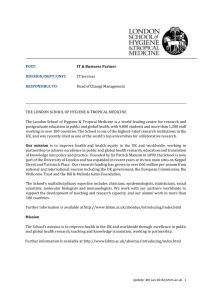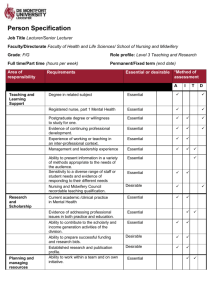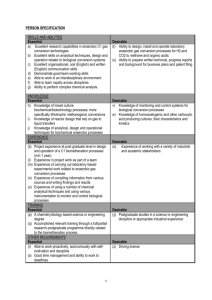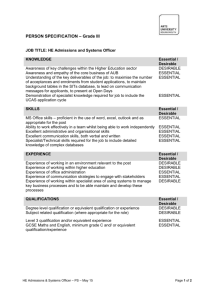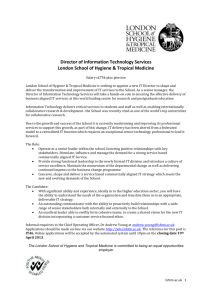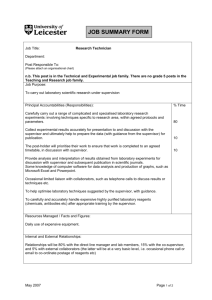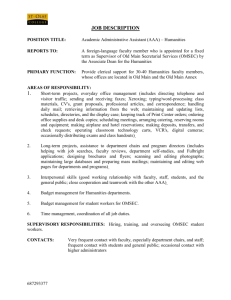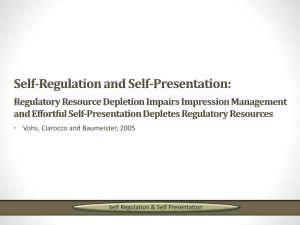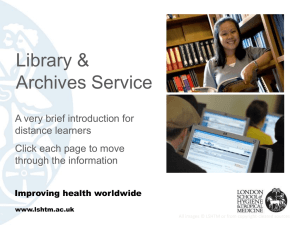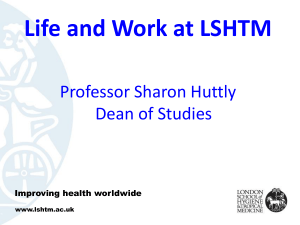LONDON SCHOOL OF HYGIENE AND TROPICAL MEDICINE
advertisement
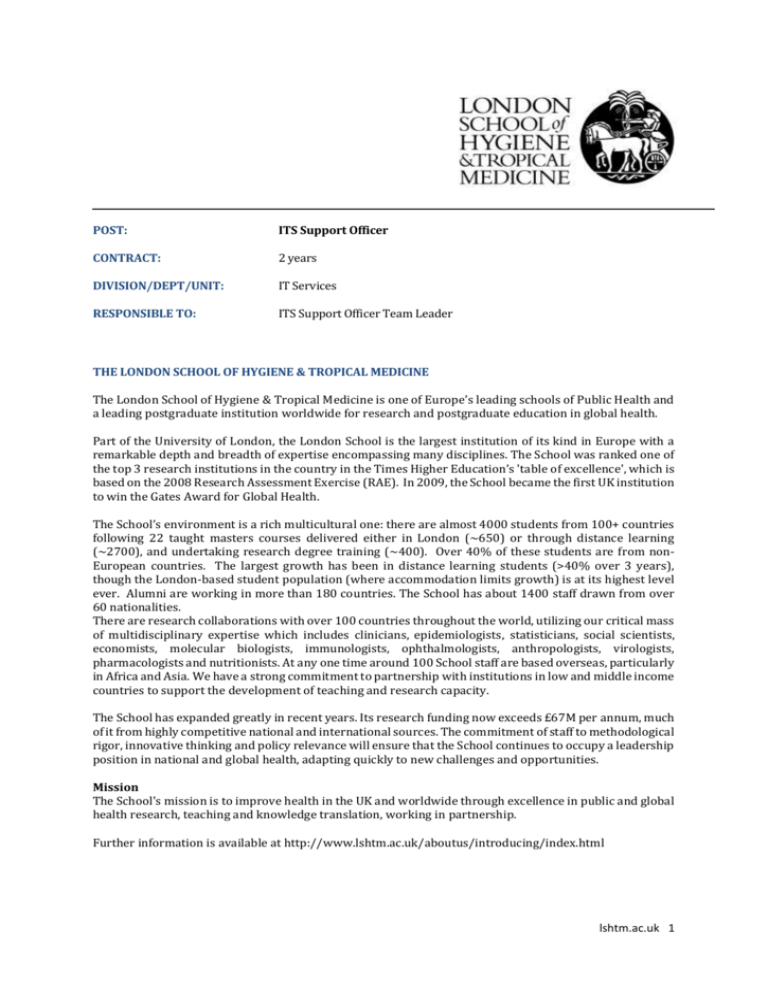
POST: ITS Support Officer CONTRACT: 2 years DIVISION/DEPT/UNIT: IT Services RESPONSIBLE TO: ITS Support Officer Team Leader THE LONDON SCHOOL OF HYGIENE & TROPICAL MEDICINE The London School of Hygiene & Tropical Medicine is one of Europe’s leading schools of Public Health and a leading postgraduate institution worldwide for research and postgraduate education in global health. Part of the University of London, the London School is the largest institution of its kind in Europe with a remarkable depth and breadth of expertise encompassing many disciplines. The School was ranked one of the top 3 research institutions in the country in the Times Higher Education’s 'table of excellence', which is based on the 2008 Research Assessment Exercise (RAE). In 2009, the School became the first UK institution to win the Gates Award for Global Health. The School’s environment is a rich multicultural one: there are almost 4000 students from 100+ countries following 22 taught masters courses delivered either in London (~650) or through distance learning (~2700), and undertaking research degree training (~400). Over 40% of these students are from nonEuropean countries. The largest growth has been in distance learning students (>40% over 3 years), though the London-based student population (where accommodation limits growth) is at its highest level ever. Alumni are working in more than 180 countries. The School has about 1400 staff drawn from over 60 nationalities. There are research collaborations with over 100 countries throughout the world, utilizing our critical mass of multidisciplinary expertise which includes clinicians, epidemiologists, statisticians, social scientists, economists, molecular biologists, immunologists, ophthalmologists, anthropologists, virologists, pharmacologists and nutritionists. At any one time around 100 School staff are based overseas, particularly in Africa and Asia. We have a strong commitment to partnership with institutions in low and middle income countries to support the development of teaching and research capacity. The School has expanded greatly in recent years. Its research funding now exceeds £67M per annum, much of it from highly competitive national and international sources. The commitment of staff to methodological rigor, innovative thinking and policy relevance will ensure that the School continues to occupy a leadership position in national and global health, adapting quickly to new challenges and opportunities. Mission The School's mission is to improve health in the UK and worldwide through excellence in public and global health research, teaching and knowledge translation, working in partnership. Further information is available at http://www.lshtm.ac.uk/aboutus/introducing/index.html lshtm.ac.uk 1 IT SERVICES AND THE NETWORK INFRASTRUCTURE The School’s systems are delivered on a variety of operating system platforms, choosing the platform best suited to the application in question. User file, print and email services are currently delivered in a clustered SLES or Novell NetWare 6.5 environment with plans to move completely to SLES in the very near future; most external-facing and network security/management systems are provided on a SLES or RedHat platform, while the School’s Management Information Systems and other services utilise Windows server. It is IT Services’ policy to virtualise new services, as well as existing services being migrated from old hardware, provided the application concerned is appropriate for virtualisation. The School’s directory service is delivered using Novell’s eDirectory, and this platform forms the basis, along with Novell’s Identity Management solution, of our current implementation of identity management and automatic provisioning, and our future plans in this area. The School’s Virtual Learning Environment is currently Moodle, a platform shared with four other University of London institutions in Bloomsbury – the Bloomsbury Learning Environment (BLE). It is used primarily at present for taught-course students studying in London, but a small number of the distance learning students also use Blackboard for learning (these are the Clinical Trials students). There are in the region of 1500 networked PCs at LSHTM, with Windows 7 desktops managed using Novell’s ZenWorks. There is a growing community of Mac users, and to a lesser extent, Linux users within the school. The School’s network infrastructure, across four sites in Bloomsbury, provides a Gigabit Ethernet backbone over fibre-optic cable, with switched 100/1000 Mbps to the desktop. There are two connections to the London Metropolitan Network, both through University College London. The structured cabling infrastructure that supports the LAN is primarily shielded Cat 5e, but new installations are now Cat 6. lshtm.ac.uk 2 JOB DESCRIPTION Job Purpose The LSHTM IT teams have undergone a reorganisation where the support structure is arranged around a central helpdesk which IT support staff rota onto. The Helpdesk manager and Team leaders will regularly rotate you onto the central helpdesk for a period doing mostly first line support, spending the rest of the time in the IT Support team doing second line support and specialist support and projects assigned to you. The IT Support Officer works with the IT Support Team Leader, the Helpdesk manager and ITS corporate functions to deliver service and support to users in the faculties and central support functions. The role holder supports the customer services team in delivering front line services. S/he is a contact point, providing assistance at all levels to all the faculties and central support functions. The role holder works with the IT Support Team Leader to develop and deliver agreed small change initiatives. S/he works with the IT Support Team Leader to ensure the ITS elements of the faculty or central support strategy are achieved. Your role will be a good mix of support and small projects; you will be covering a wide range of activities and meeting a wide range of people. It is essential that the Helpdesk Service is kept flexible and personal, and functions successfully to cover all aspects of IT in the School. As part of Customer Services, it is expected that your office hours will normally eight hours between 8:30am-5:30pm depending on your shift; you will also be part of the rota system having a regular shift on the helpdesk. You may be required to help with out of hours work. As a rule any maintenance work which involves disruption is carried out out-of-hours. This may involve early morning work or evening work on the first Wednesday of each month. Major upgrades may involve weekend work. Arrangements for time off in lieu apply. This is an exciting opportunity for someone committed to delivering a high standard of user support service, who is capable of delivering support in a flexible and positive manner. lshtm.ac.uk 3 Responsibilities 1. Support the relationships/delivery to the faculties/departments in relation to IS strategies, developments and operations 2. Capture and document detailed analysis of end to end business requirements across the faculty/department 3. Assist in measuring the quality of the ITS management service delivered to the faculties/departments 4. To support and manage the delivery of secondary support activities in the faculties (eg AV, desktop and print support etc) 5. Ensure all centrally agreed policies, procedures and governance are delivered consistently across the faculties 6. Work with the central IT core services to ensure a consistent approach to all ITS activity 7. Work with other IT Support Officers ensure consistency of service and approach 8. Support the management and communication of service and development plans 9. Assist in the production of business design specifications for agreed business requirements 10. Ensure the needs of faculty/department management are met through relationships both internal and external 11. Actively support the faculties/departments to ensure that continual improvement is delivered through innovation where possible 12. Promote and support effective change 13. To deliver small projects and changes within the school, ensuring alignment with central IT strategy 14. Undertake any other duties as reasonably delegated by your line manager 15. Manage your own continuous professional development, internal collaborations and external networks, in order to contribute to service quality, research excellence and innovation 16. Demonstrate the School’s values through your behaviour at work, including your duties and responsibilities in respect of equality and diversity, health and safety, data protection, and any other legislative requirement lshtm.ac.uk 4 PERSON SPECIFICATION Qualifications The successful candidate should: Essential/ Desirable Tested by* 1 Hold an undergraduate degree or have equivalent professional experience Essential A 2 Have undergone ITIL or be a qualified ITIL practitioner Desirable A, I 3 Demonstrate ongoing professional development Desirable A, I Working in an IT team for an educational establishment Essential A, I The IT development cycle Desirable A, I Delivering customer facing support activities Essential A,1 IT service management and its effective operation Desirable A, I Delivering and supporting AV services Desirable I Supporting business cases for change and delivering the change Desirable A, I Operating as an IT officer within a complex environment. Essential A, I Working with different levels of management. Desirable I Working in a customer focused and results orientated environment; Essential A, I Providing high quality IT support within a business partnering model, and working with managers proactively to develop their IT capability and capacity Desirable A, I Contributing to the successful achievement of targets and objectives Essential A, I * A = application; I = interview; T = test Background & Experience The successful candidate should have a background in, or experience of: Contributing to resource planning to fulfil current and future business requirements Desirable A, I Desirable A,1 Interest in leading edge ITS services, principles and techniques, and their application in complex organisations (and associated issues) Desirable I How the IT Partner model supports an organisation to achieve its strategic aims Desirable I The dynamics of higher education and academic endeavour Desirable I Current IT developments and service delivery Desirable A, I The drive to complete tasks and a focus on results Essential A, I A business partnering approach to IT and the ability to identify business requirements and successfully apply these to support and change delivery Desirable I Developing a network of key individuals to secure knowledge and support Knowledge The successful candidate should have demonstrable knowledge of: Skills & Competencies The successful candidate should demonstrate: lshtm.ac.uk 5 Confidence in operating in an environment of change with the ability to use change management models/frameworks Desirable A, I Positive communication skills: verbal, written and in presentations. The ability to sell ideas or benefits and build persuasive arguments based on data, logic and the objective merits of solutions Essential A, I The ability to build and sustain effective professional working relationships within IT and wider business environment Essential A, I A strong customer focus – demonstrating a thorough understanding of customer needs Essential A, I The ability to look continuously for opportunities for improvement – adapting thinking and behaviour to suit the requirements of different situations Essential A, I Positive interpersonal skills Essential A, I Commercial awareness Desirable I lshtm.ac.uk 6
